Seneca valley virus confirmed in mystery pig deaths
 © Tim Scrivener
© Tim Scrivener Five cases of vesicular disease in pigs found on East Anglian pig farms last year were Seneca valley virus (SVV), Defra has confirmed.
The first cases appeared at a farm near Feltwell in Norfolk, near the Suffolk border, on 23 June, when animals displayed symptoms similar to foot-and-mouth disease.
The discovery sparked fears of another foot-and-mouth outbreak similar to 2001, which led to the slaughter of 6.5 million animals and cost the industry an estimated £8bn.
See also: How strict pig biosecurity can help to hit antibiotics targets
But following an extensive investigation, the Animal and Plant Health Agency said the five cases identified on Norfolk farms were all SVV.
SVV only affects pigs for a short period, infected pigs make a full recovery and there is no risk to human health.
Defra urged pig producers and vets to continue to promptly report any clinical signs of vesicular disease in pigs and always maintain high biosecurity standards.
Pig keepers should inspect their animals at least once a day, staying vigilant for lameness, as well as blisters and lesions on the feet, mouth or snout.

